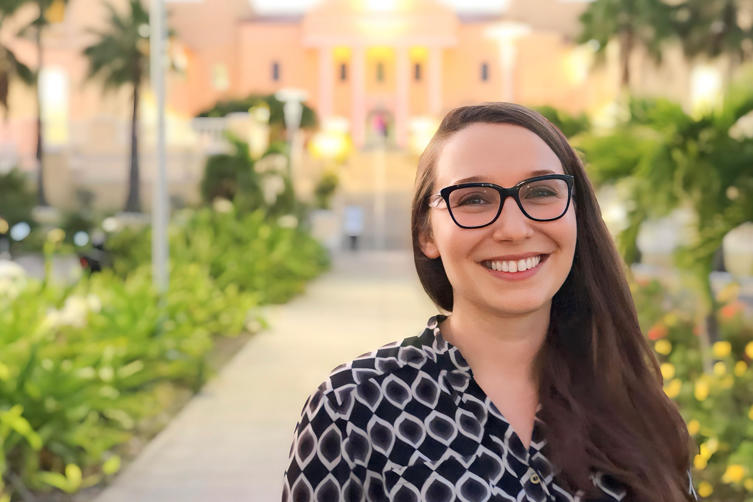On the heels of Alzheimer's Awareness Month in November, we interviewed Izabella Shuvayev, MD ’13, a geriatric psychiatrist who specializes in Alzheimer's disease, dementia, and other cognitive and neurodegenerative disorders. Dr. Shuvayev, a 2013 graduate of American University of the Caribbean School of Medicine (AUC) in Sint Maarten, did her psychiatry residency at the Institute of Living, a leading mental health center in Hartford, Connecticut, and completed a fellowship in geriatric psychiatry at Mount Sinai Hospital in New York City. Dr. Shuvayev practices at the Newington Veterans Affairs Clinic near Hartford and is certified by the American boards of Psychiatry and Geriatric Psychiatry.
Q: What exactly is geriatric psychiatry and what is your personal role in the field?
A: Geriatric psychiatry is a subspecialty of psychiatry dealing with the mental health of older adults. As the body ages and the metabolic activity slows down, medications and treatment effects may be profoundly different. Older people tend to accumulate multiple medical conditions that require multiple medications, which may affect mood, anxiety, and cognitive status. Our field focuses on carefully reviewing medications and mitigating the risks of polypharmacy (using multiple medications for a single condition), evaluating and treating patients with memory or other cognitive complaints, and treating older adults with a range of psychiatric conditions.
My background in cognitive disorders allows me to work closely with my colleagues at the mental health clinic and provide recommendations on further workup and treatment of patients with suspected cognitive decline in conjunction with chronic mental illness.
Q: What drew you to geriatric psychiatry?
A: I enjoyed my Memory Disorders Center rotation during residency training and saw the need for and importance of accurately diagnosing neurodegenerative disorders in order to guide and support patients and families dealing with these difficult conditions.
Q: What do you find most rewarding about your field?
A: In addition to clarifying the reasons for cognitive impairment, one of the most rewarding aspects of my work is seeing dementia patients’ symptoms improve due to enhancement in caregiver’s understanding of the disease progression. Frequently, making behavioral adjustments is key to improving the quality of life of both the patient and the caregiver.
Q: What is the difference between dementia and Alzheimer’s disease?
A: Dementia is an umbrella term for significant cognitive impairment impacting functional status in daily activities. Dementia can be caused by a multitude of conditions. Alzheimer’s disease is the most common neurodegenerative dementia. The terms “dementia” and “Alzheimer’s” are not interchangeable. While all Alzheimer’s disease is dementia, not all dementia is Alzheimer’s. Other dementias include - vascular, frontotemporal degeneration, Lewy Body disease, among others.
Q: Are there definitive tests for diagnosing Alzheimer’s? How do they work?
A: A “definitive” diagnosis typically requires autopsy. However, physicians use various diagnostic tools to clarify the cause of a person's cognitive impairment or dementia. There are multiple components to diagnosing Alzheimer’s disease. These include gathering extensive history and collateral information, a neurological exam, neuropsychological testing, imaging, and blood tests. This information together supports the likelihood of the diagnosis. Amyloid Positron Emission Tomography (PET) scans are used in research to determine whether a person has the beta-amyloid plaque burden (thought to be the causative agent of Alzheimer’s). However, such tests are not widely available nor covered by insurance.
Thus, Magnetic Resonance Imaging (MRI) is typically used to assess structural abnormalities and rule out other causes of neurodegenerative problems, such as strokes, for example. There are also blood and spinal fluid tests that can help determine presence of amyloid plaque burden in the brain.
Q: What are the signs and symptoms of Alzheimer’s disease?
A: While presentations differ, patients classically suffer from increased difficulty with learning, memory, and language changes accompanied by a decline in ability to perform daily activities (managing bills, medications, transportation needs, etc.). Because Alzheimer’s is a slowly progressive neurodegenerative condition, these changes may not be noticed by patient and family for many months or even years.
Q: Have any therapies, drugs, or other treatments proven effective in the management or slowing of Alzheimer’s?
A: For over 20 years, there have not been any new agents on the market for treatment of Alzheimer’s disease. Cholinesterase inhibitors (donepezil, galantamine, rivastigmine) and an N-methyl-D-aspartate (NMDA) receptor antagonist (memantine) are used to treat some symptoms of both cognitive and behavioral Alzheimer’s. However, because these medications don’t change the progression of the disease and the effects are often mild, they are frequently underused. I find these medications are helpful for behavioral and psychological symptoms of Alzheimer’s dementia.
In July 2023, the United States Food and Drug Administration (FDA) approved Leqembi , a monoclonal antibody, which targets beta-amyloid plaque formation for patients with mild dementia or mild cognitive impairment caused by Alzheimer’s disease. In Phase 3 trials, the drug showed modest slowing of cognitive decline. The drug is a biweekly infusion, which requires multiple MRI scans to monitor for brain swelling (ARIA-E) and micro-hemorrhages (ARIA-H), which are potential side effects of this drug. This drug was not tested on patients with later stages of the disease.
Q: Which are the most promising areas of current Alzheimer’s research?
A: In October, Eisai and Biogen, the creators of Leqembi, announced a potential alternative to the infusion formulation of the drug that will come as an injectable, for ease of administration. There are multiple directions the research is going, from the prevention of beta amyloid plaque formation and tau protein tangles to agents that reduce inflammation. Although, as a result of multiple failed trials targeting amyloid formation, there is a considerable debate in the research community regarding the causative agent of Alzheimer’s, and thus which protein the drugs should target.
Q: How do you work with patients with memory issues?
A: Working with patients with memory decline requires the involvement of a care partner (family or friend), who can report changes and provide pertinent history, as well as support the patient in managing care recommendations and assist with care planning.
Q: How can physicians—and families and friends—better address the needs and concerns of aging persons?
A: It’s important to understand that slowing down is part of aging. Relying on notes/organizing tools, repetition, and taking longer to learn new information are normal parts of aging. Exercising patience, curiosity, and empathy is important when working with all patients.
Q: When should a physician refer a patient to a geriatric psychiatrist? Is there a tipping point when symptoms call for psychiatric attention?
A: Several specialties focus on diagnosing and providing support for patients with neurocognitive disorders, including behavioral neurologists, geriatricians, and geriatric psychiatrists. Often, geriatric psychiatrists are involved in addressing behavioral and psychological symptoms of dementia such as agitation, aggression, depression, anxiety, and psychosis.
Q: How do you help families provide care for loved ones with memory issues?
A: It is paramount to provide an accurate diagnosis for cognitive impairment and discuss the diagnosis with the patient and family. Ruling out reversible conditions is the first step. If the diagnostic work up yields results suggestive of progressive neurodegenerative conditions such as Alzheimer’s, Lewy Body, or another dementia, we discuss the appropriate medications. We also address patient safety (operating motor vehicles, safely living alone); evaluate caregiver availability, needs, and education; review Advance Directives and other legal planning; provide information for community resources and conduct serial evaluations of cognitive and behavioral status. These elements are all integral parts of caring for older adults with progressive neurodegenerative conditions.
Q: What do you like best about your work?
A: I enjoy learning from my patients and sharing my knowledge with them. On the same morning I may see a veteran in her 30s struggling with very different life stage challenges than the next patient who is in his 90s. Working with the veteran population is both rewarding and keeps me on my toes!
Q: In what professional activities do you participate?
A: With national shortages of psychiatrists, especially geriatric psychiatrists, there aren’t enough specialists to care for our aging population. Therefore, the next best thing is educating physicians to recognize and manage cognitive impairment. I participate in seminars teaching both trainees and faculty members in evaluating and managing patients with neurocognitive disorders. I am on the membership committee of the American Association for Geriatric Psychiatry, and I attend and present at annual meetings. During my time at the Memory Care Center, I presented at community outreach webinars on understanding Alzheimer’s disease and other topics. I am also involved in AUC alumni events.
Q: Speaking of AUC, what do you remember best about your time there as a medical student? Do you miss the island or the campus, maybe a class or professor?
A: I remember the beautiful sunsets and how great it was great to spend time outdoors when not studying. I frequently studied on campus, especially in the cafeteria, where a bunch of us studied together. While I enjoy New England’s seasons, there is something magical about the reliability of sunny skies and temperatures in the 80s whether you are heading to the beach or to class almost any day of the year!
For more on Alzheimer’s disease, visit the United States National Institute on Aging and check out the in-depth Alzheimer’s Association report, 2023 Alzheimer’s Disease Facts and Figures . The Alzheimer’s Foundation of America has more information on Alzheimer’s Awareness Month. To learn more about geriatric psychiatry, visit the American Psychiatric Association and the American Association for Geriatric Psychiatry .
At AUC School of Medicine, we’re training future psychiatrists and other specialist physicians. Our 2022–2023 MD graduates achieved a 97% first-time residency attainment rate*, and are now beginning their post-graduate training across 24 specialties . Learn more about AUC and its MD program , as well as the requirements for admission . Thank you, Dr. Shuvayev, for taking the time to enlighten us with your expertise!
*Percentage of students attaining a 2023–2024 residency position out of all graduates or expected graduates in 2022–2023 who were active applicants in the 2023 NRMP match or who attained a residency position outside the NRMP match.





